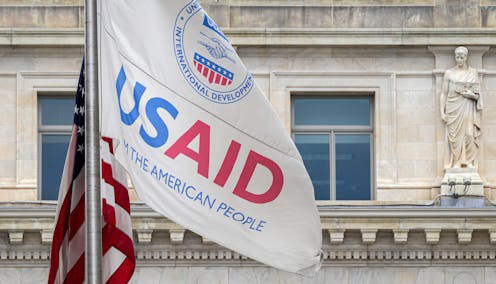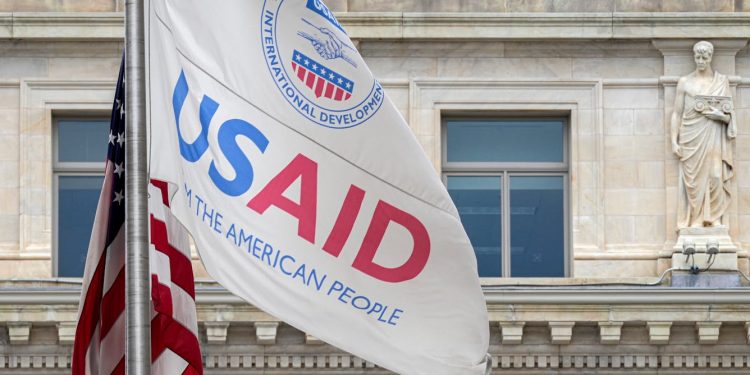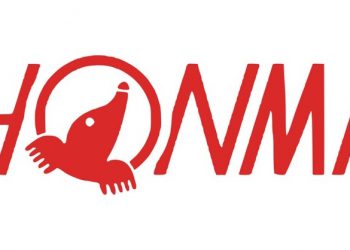
The U.S. government gives other nations US$68 billion of foreign assistance annually – more than any other country. Over half of this sum is managed by the U.S. Agency for International Development, including funds for programs aimed at fighting hunger and disease outbreaks, providing humanitarian relief in war zones, and supporting other lifesaving programs such as the President’s Emergency Plan for AIDS Relief.
President Donald Trump suspended most U.S. foreign aid on Jan. 20, 2025, the day he took office for the second time. The next day, Secretary of State Marco Rubio issued a stop-work order that for 90 days halted foreign aid funding disbursements by agencies like USAID.
A week later, dozens of senior USAID officials were put on leave after the Trump administration reportedly accused them of trying to “circumvent” the aid freeze. The Office of Management and Budget is now pausing and evaluating all foreign aid to see whether it adheres to the Trump administration’s policies and priorities.
I’m a scholar of foreign aid who researches what happens to the U.S. government’s local partners in the countries receiving this assistance when funding flows are interrupted. Most of these partners are local nonprofits that build schools, vaccinate children, respond to emergencies and provide other key goods and services. These organizations often rely on foreign funding.
A ‘reckless’ move
Aid to Egypt and Israel was spared, along with some emergency food aid. The U.S. later waived the stop-work order for the distribution of lifesaving medicines.
Nearly all of the other aid programs remained on hold as of Jan. 29, 2025.
Many development professionals criticized the freeze, highlighting the disruption it will cause in many countries. A senior USAID official issued an anonymous statement calling it “reckless.”
InterAction, the largest coalition of international nongovernmental organizations in the U.S., called the halt contrary to U.S. global leadership and values.
Of the $35 billion to $40 billion in aid that USAID distributes annually, $22 billion is delivered through grants and contracts with international organizations to implement programs. These can be further subcontracted to local partners in recipient countries.
When this aid is frozen, scaled back or cut off altogether, these local partners scramble to fill in the gaps.
The State Department manages the rest of the $68 billion in annual U.S. foreign aid, along with other agencies, such as the Peace Corps.

Kevin Dietsch/Getty Images
How local nonprofits respond and adapt
While sudden disruptions to foreign aid are always destabilizing, research shows that aid flows have fluctuated since 1960, growing more volatile over the years. My research partners and I have found that these disruptions harm local service providers, although many of them manage to carry on their work.
Over the years, I have conducted hundreds of interviews with international nongovernmental organizations and these nonprofits’ local partners across Latin America, Africa and Asia about their services and funding sources. I study the strategies those development and humanitarian assistance groups follow when aid gets halted. These four are the most common.
1. Shift to national or local government funding
In many cases, national and local governments end up supporting groups that previously relied on foreign aid, filling the void.
An educational program spearheaded by a local Ecuadorian nonprofit, Desarrollo y Autogestión, called Accelerated Basic Cycle is one example. This program targets young people who have been out of school for more than three years. It allows them to finish elementary school – known as the “basic cycle” in Ecuador – in one year to then enter high school. First supported in part by funding from foreign governments, it transitioned to being fully funded by Ecuador’s government and then became an official government program run by the country’s ministry of education.
2. Earn income
Local nonprofits can also earn income by charging fees for their services or selling goods, which allows them to fulfill their missions while generating some much-needed cash.
For example, SEND Ghana is a development organization that has promoted good governance and equality in Ghana since its founding in 1998. In 2009, SEND Ghana created a for-profit subsidiary called SENDFiNGO that administers microfinance programs and credit unions. That subsidiary now helps fund SEND Ghana’s work.
Bangladesh Rural Advancement Committee and the Grameen Bank, which is also in Bangladesh, use this approach too.
3. Tap local philanthropy
Networks such as Worldwide Initiatives for Grantmaker Support and Global Fund for Community Foundations have emerged to promote local philanthropy around the world. They press governments to adopt policies that encourage local philanthropy. This kind of giving has become easier to do thanks to the emergence of crowdfunding platforms.
Still, complex tax systems and the lack of incentives for giving in many countries that receive foreign aid are persistent challenges. Some governments have stepped in. India’s corporate social responsibility law, enacted in 2014, boosted charitable incentives. For example, it requires 2% of corporate profits to go to social initiatives in India.
4. Obtain support from diaspora communities
Diasporas are people who live outside of their countries of origin, or where their families came from, but maintain strong ties to places they consider to be their homeland.
Local nonprofits around the globe are leveraging diaspora communities’ desire to contribute to economic development in their countries of origin. In Colombia, for example, Fundación Carla Cristina, a nongovernmental organization, runs nursery schools and provides meals to low-income children.
It gets some of its funding from diaspora-led nonprofits in the U.S., such as the New England Association for Colombian Children, which is based outside of Boston, and Give To Colombia in Miami.
A push for the locals to do more
Trump’s stop-work order coincided with a resurgence of a localization push that’s currently influencing foreign aid from many countries.
With localization, nations providing foreign aid seek to increase the role of local authorities and organizations in development and humanitarian assistance. USAID has been a leading proponent of localization.
I believe that the abruptness of the stop-work order is likely to disrupt many development projects. These projects include support to Ukrainian aid groups that provide emergency humanitarian assistance and projects serving meals to children who don’t get enough to eat.
To be sure, sometimes there are good reasons for aid to be halted. But when that happens, sound and responsible donor exit strategies are essential to avoid the loss of important local services.
![]()
Susan Appe does not work for, consult, own shares in or receive funding from any company or organization that would benefit from this article, and has disclosed no relevant affiliations beyond their academic appointment.













